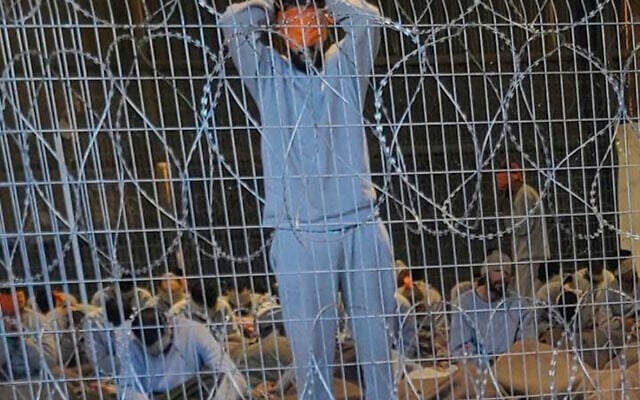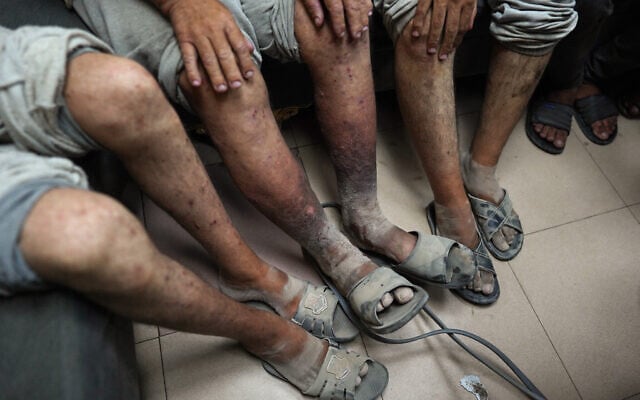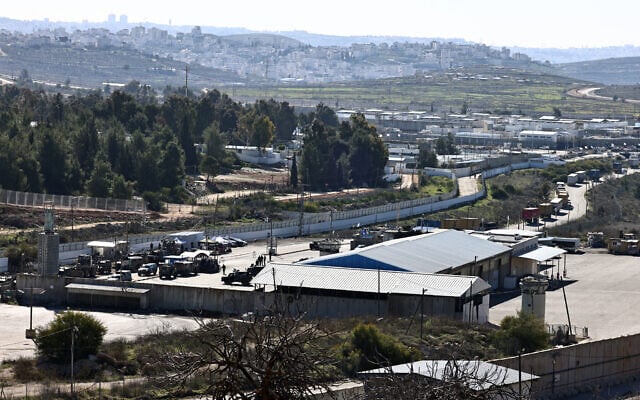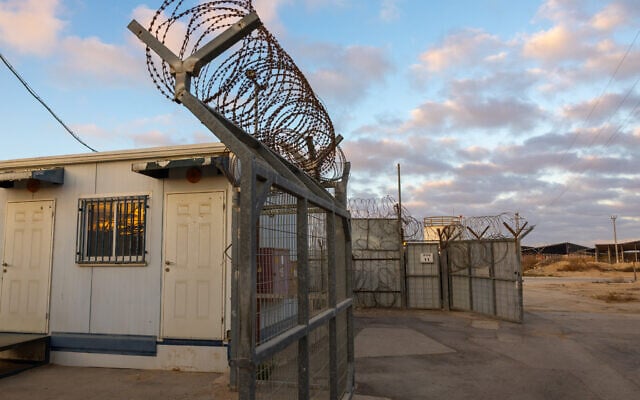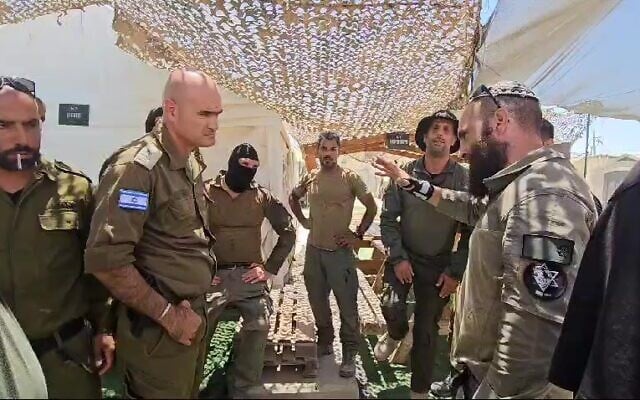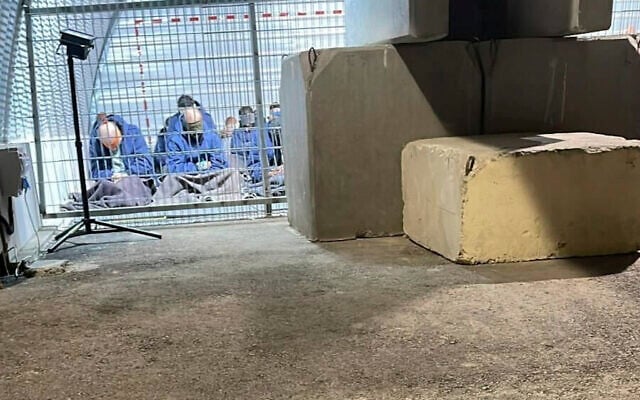


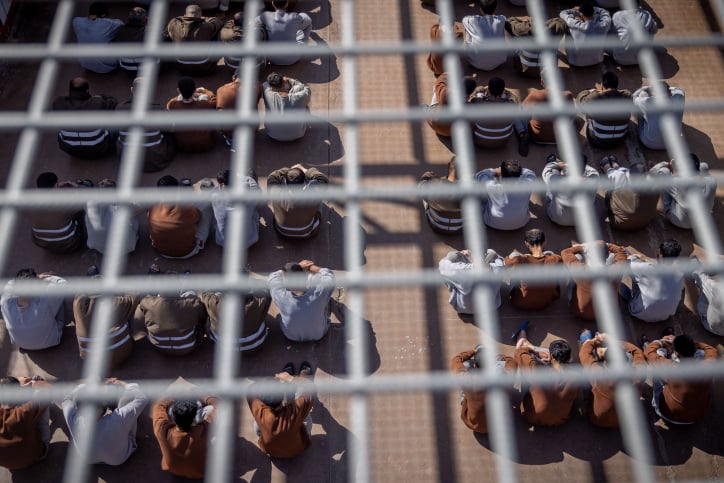
A new report by the Physicians for Human Rights Israel (PHRI) organization which advocates for Palestinian human rights has found that Gazan medical personnel detained by Israeli forces and held in Israeli detention facilities during the war with Hamas were subjected to widespread and severe abuse, including beatings, different forms of torture, psychological abuse, medical neglect and the provision of insufficient rations.
The report is based on testimony provided by 24 detainees to PHRI lawyers who were able to visit those individuals in the military detention centers or Israel Prison Service facilities where they were being held.
One detainee talked of being suspended by her wrists for hours, others said they were severely beaten under interrogation and were subjected to prolonged high-volume music, as well as being defecated on by dogs, and other abuses.
Detainees also complained of severe conditions in the detention facilities, with infectious diseases such as scabies rampant, malnutrition due to improper diet which itself weakened their immune systems and made them more susceptible to disease, and a failure to properly treat injuries caused by beatings and abuse.
Complaints about being humiliated by detention facility guards in different ways and prolonged handcuffing – in one case for four months – were also made by detainees.
Those interviewed described problematic legal processes employed by Israeli authorities, including concerns that arrests were arbitrary, as well as denial of access to a lawyer and having to sign documents in Hebrew, which the detainees did not understand.
PHRI also pointed out that the prolonged detention of Gazan medical personnel, including nurses, paramedics, intensive care doctors, surgeons, gynecologists, pediatricians and others, meant they were unavailable to provide sorely needed medical care for the Gazan population.
Thousands of Palestinian civilians have sustained severe injuries during Israel’s military operation and suffered from the outbreak of diseases and other ailments resulting from the mass dislocation of the overwhelming majority of Gaza residents.
The Healthcare Workers Watch organization, a Palestinian NGO founded after the October 7 atrocities and the outbreak of war and cited in PHR’s study, claims that some 339 healthcare workers have been detained by Israeli forces in the Gaza Strip since the start of military operations, with at least 180 still in detention.
Israeli forces carried out widespread raids on Gaza hospitals amid terror groups using the facilities as bases and staging grounds for attacks on Israel. Israel also showed a video of hostages being kept at Gaza hospitals.
Several healthcare workers interviewed by PHR lawyers also stated that fellow detainees had been beaten so severely that they subsequently died of their injuries.
Israeli authorities disclosed to PHRI, following a freedom of information request the organization filed, that 44 Palestinian detainees have died in Israeli military custody, and as of September 2024, 21 detainees have died in the custody of the Israeli Prisoner Service (IPS).
The PHRI report comes just a week after five IDF reserve soldiers were indicted by the Military Advocate General’s office on charges of assault and causing injury under aggravated circumstances over an incident in which they allegedly severely beat, stabbed and injured a Palestinian security prisoner in the notorious Sde Teiman military detention facility.
The testimony of the detainees interviewed by PHRI lawyers reflects testimony given by other, non-medical personnel detainees from both Gaza and the West Bank taken by another human rights organization and seen by The Times of Israel, in which similar allegations were made.
The authors of the PHR study said the “deliberate disregard for ensuring humane treatment and legal protections” described to them by detainees violated international law and also demonstrated that Israeli authorities were unwilling to put a stop to such abuses and were therefore complicit in them.
The IDF said in response that “many of the claims are not accurate or lack foundation, and echo disinformation which is spread by Hamas activists.”
The army said that it had arrested medical personnel suspected of being terror operatives and that they were detained and held “in accordance with the law.” The IDF added that rations are provided per the instructions of a dietician and that all detainees are provided with appropriate medical treatment when needed.
The Israel Prison Service said in response that it “operates in accordance with the law, under strict scrutiny of many official inspectors,” and added that “all prisoners are held in accordance with the law while respecting their basic rights and under the supervision of a professional and trained prison guard [corps].”
The IPS said it was unaware of the allegations made in the PHRI report and that, as far as it was aware, the allegations were incorrect.
The Human Rights Watch organization has detailed similar allegations made by released detainees in August 2024 to those in the PHRI report, as has the B’Tselem human rights group in its August 2024 report, while testimony collected by Healthcare Workers Watch and published in October 2024 painted a similar picture.
Several media reports have detailed abuse against Gazan detainees more broadly.
Six IDF reserve soldiers serving in Sde Teiman have been indicted over two separate incidents so far, on charges of assault, causing injury, and other alleged crimes.
During the course of the war, Israel has worsened the conditions under which Palestinian detainees and security prisoners are held on several occasions.
Legal rights were curtailed for Gazans detained under the law for unlawful combatants, increasing the amount of time they can be held before being brought before a judge and before being given access to a lawyer.
The government has also banned all Palestinian prisoners and detainees from access to Red Cross visits and has repeatedly delayed filing responses to the High Court to petitions demanding the ban be lifted.
The government requested another delay on Wednesday.
PHRI’s lawyers collected testimony from healthcare workers detained by Israeli security forces in Gaza, interviewing 24 such individuals between July and December 2024 in IDF and IPS detention facilities.
The interviewees described numerous abuses they said they were subjected to, which would seemingly violate Israeli and international law and possibly constitute war crimes.
Apart from one interviewee who was released in October 2024, PHRI did not publish the names of any of the detainees since they remain in Israeli detention facilities, with the organization expressing concern for retaliation against anyone whose name would be published.
Several interviewees described being severely beaten immediately upon their arrest and during their interrogation.
“The soldiers handcuffed our hands behind our backs and shackled our legs too tightly,” said Dr. Khaled Alser, a 32-year-old surgeon who worked at the Nasser hospital in Khan Younis and who was released without charge in October last year.
He was arrested in the hospital and held in different locations in Gaza before being transferred to a detention facility inside Israel. Alser gave his testimony in July 2024 in the Ofer military detention camp.
“They threw the three of us into a military jeep and drove us around for over two hours. During the ride, they humiliated and beat us—sitting on us, kicking us with their boots, and striking us with their rifle butts. We begged them to stop, but they continued.”
Detainees also reported beatings and different forms of torture during interrogation.
“I was suspended by my wrists from the ceiling, my legs forced backward, and left in that position for hours,” said A.MQ, a 38-year-old nurse, describing her time in a Shin Bet interrogation facility. She gave her testimony in the Nafha prison in southern Israel in October 2024.
“They humiliated me and spat on me… During the interrogation in Ofer Prison, they extinguished cigarettes on my head and poured coffee over me. I was brutally beaten.”
Dr. K.J., a dentist arrested in Shfa hospital, was detained inside the hospital in March 2024, and gave his testimony to a PHRI lawyer in November 2024 in the Ofer military facility.
“The captain interrogated me about tunnels, terrorist operatives, and weapons. Every time I said I didn’t know, he beat me, punched me, and kicked me in the testicles, along with frequent cursing,” said K.J.
Numerous other detainees interviewed by PHRI reported similar such beatings after being arrested and during the transfer to whichever detention facility they were taken to.
Several detainees also stated that they were placed in a “Disco Room” before or during interrogation for extended periods, where extremely loud music was played and bright lights flashed at the detainee.
Many of the detainees also reported that they were not asked questions as to whether they were involved in terrorist activity but rather were questioned about their knowledge of Hamas’s tunnel network, the whereabouts of hostages and Hamas operatives.
“Based on these testimonies, it appears the interrogations were mainly aimed at intelligence gathering rather than investigating alleged security offenses,” PHRI alleged in its report.
Numerous interviewees also reported being denied access to a lawyer and not being brought before a judge for lengthy periods of time, being made to sign statements they made during interrogation but which had been translated into Hebrew, and other problematic legal concerns.
The report also highlighted severe abuses at Israeli detention facilities.
“For three days, ‘Force 100’ soldiers raided the enclosures with dogs, beating prisoners, and allowed the dogs to urinate and defecate on us,” said Dr. M.T., Head of Surgery at the Indonesian Hospital in northern Gaza, of his time in the Sde Teiman military detention facility. He gave testimony in July 2024 in the Ofer military camp.
Force 100 is a Military Police reserve unit tasked with riot control and other functions.
“At every stage, we endured beatings and severe violence—batons, dog attacks, and boiling water poured on us, causing severe burns,” said Dr. N.T., Head of Surgery at Nasser Hospital in Khan Younis, who was arrested in February 2024.
“Things have improved slightly now, but some guards still beat us and curse at us,” he added in his testimony, given in November 2024 in the Ketziot prison facility.
A nurse who works at Nasser Hospital held in the Ofer military camp facility and Ketziot Prison gave similar testimony.
“At Ofer camp, the beatings were relentless—especially during the daily roll call. My ‘welcoming; at Ketziot was brutal: they beat me mercilessly, poured hot water on me, and burned my neck.”
Several detainees also reported having heard about other prisoners having been violently sexually assaulted, although none of those interviewed said they themselves had been subjected to sexual assault.
Additionally, all detainees reported that the rations provided by the detention facilities were insufficient and led to malnutrition. Interviewees stated that almost every meal, given for breakfast, lunch and dinner, consisted of four to six slices of bread, with a small amount of cheese or a sugary spread.
Occasionally, detainees were given a meal of processed meat, boiled potatoes, or boiled pasta once a week, but fruit and vegetables were rarely provided.
Another key issue raised by the detainees was medical neglect. This included denying the detainees medicine they needed for treatment of medical conditions they suffered from before detention.
Injuries sustained due to beatings by prison guards were frequently left untreated, interviewees said, as were diseases contracted while in detention, including those caused by unsanitary conditions in which they were held.
Detainees reported being given either no soap or very little, as well as insufficient amounts of toilet paper, sometimes one roll per cell, per day, when each cell can house as many as 30 prisoners.
“In the enclosure for sick patients, one prisoner, M., had a stroke,” said Dr. M.T, but the prisoner was not treated despite the prisoners requesting he be helped.
“After a day or two, we told a guard that M. wasn’t eating or drinking,” continued M.T., and added that the prisoners warned an officer that the prisoner was going to die. “A doctor arrived, but M. had already died. His body was placed in a wheelchair and taken away.”
M.T. also noted that a female soldier at the facility he was held in accused a prisoner of harassing her.
“Soldiers arrived and beat him on the head, and he died a few hours later,” he said.
M.T. said that after he was initially detained, his captors “beat us with batons half to death, cursing us, and electrocuting us,” and that they broke two of his ribs.
“I still feel pain when I breathe because of [the] two broken ribs. One has healed, but the other still feels loose. They won’t take me to the hospital,” he said.
M.T. added that he had been held constantly handcuffed and blindfolded for some four months, until just a few days before he met the PHRI lawyer.
Dr. M.K., an orthopedic surgeon at Shifa Hospital who was interviewed while in detention at the Ofer military facility in July and again in October 2024, described the result of unsanitary conditions at the camp.
“Skin diseases, bacterial infections, asthma symptoms, and dermatitis are spreading among the prisoners. There is a doctor, but we never see him. There are detainees with illnesses, yet no doctor examines them. There is a clinic, but detainees aren’t seen there.”
N. T. said the poor quality of food in the first five months of detention weakened detainees’ immune systems.
“Scabies spread, along with contagious skin diseases. The constant itching led to infections, abscesses, and severe skin fungus in sensitive areas. We need antibiotics and medication for inflammation,” the doctor said.
N.T. said he suffered from high blood pressure predating his arrest, for which he had been taking three types of medication and had undergone catheterization and an angiogram.
“At Baraksat [Sde Teiman], I didn’t receive any medical treatment. For the first 10 days after my arrival at Ofer, they gave me medication, but then it was stopped… When I arrived at Ketziot, I saw a doctor and was prescribed [a certain medicine], but it caused complications and headaches. I reported it multiple times, but they dismissed it and simply said, ‘It is what it is. ’”
The authors of the PHRI report, Maha Loulou and Oneg Ben Dror, asserted that the mass detention of Gazans, including medical personnel, violated international law and was unlawful since they were being held without charge.
“Their continued detention in dire conditions constitutes an ongoing violation of their basic rights. These individuals are subjected to degrading and harmful treatment, including abuse, starvation, and the denial of medical care, all of which amount to systematic torture,” said Loulou and Ben Dror.
They also said that the “widespread and systematic nature of the mistreatment” demonstrated that the abuse was deliberate.
“This deliberate disregard for ensuring humane treatment and legal protections –mandated by both national and international law — along with the severe lack of oversight, demonstrates Israeli authorities’ unwillingness to end the abuses and confirms their complicity in these unlawful acts,” the authors asserted.
The IDF broadly rejected the allegations in PHRI’s report.
“The publication by the organization ‘Physicians for Human Rights’ presents itself as a ‘position paper,’ but in practice it makes many claims that are inaccurate or baseless, and echoes disinformation spread by Hamas activists. The IDF rejects the claims made in the publication outright and addresses the main points.
“As part of the fight against terrorist organizations in Gaza, the IDF arrests those suspected of involvement in terrorism, including medical personnel or those who pretended to be such and were found to have been involved in terrorist activity,” the IDF added, saying their detention is subject to judicial review.
The IDF said claims of forced disappearance were “incorrect,” and said detainees “are entitled to meet with lawyers in accordance with the law, receive three meals a day in the quantity and composition approved by a nutritionist,” and that water is available to detainees at all times.
“Each detainee undergoes a medical examination upon admission and receives medical treatment as required, including referral to hospitals if necessary.
“Detention facilities are continuously monitored by commanders and external inspectors, including civilian judges, and any harm to detainees is prohibited and constitutes a violation of the law and IDF regulations. Exceptional cases are examined in depth and referred to the investigating military police.
“As for allegations of abuse, the cases described are not known; as more details are received, further examination will be conducted.”
The Israel Prison Service said in response that it “operates in accordance with the law, under the strict supervision of numerous official inspectors.
“All prisoners are held in accordance with the law, while ensuring their basic rights and under the supervision of a professional and trained prison guard [corps].
“We are not aware of the allegations described and, as far as we know, they are not true. However, every prisoner and detainee has the right to complain through the accepted [legal] channels and their claims will be investigated.”

